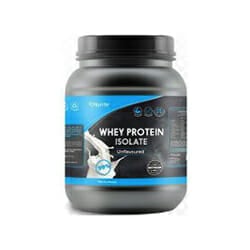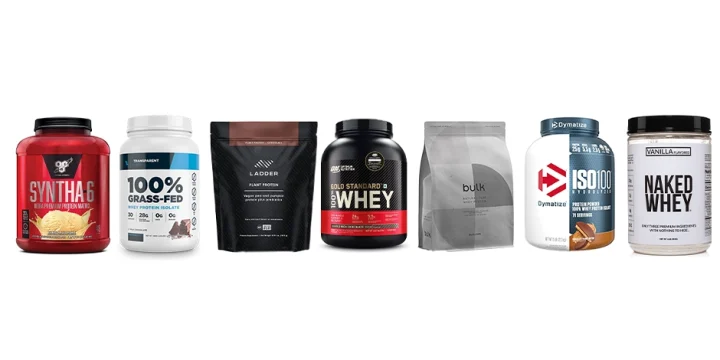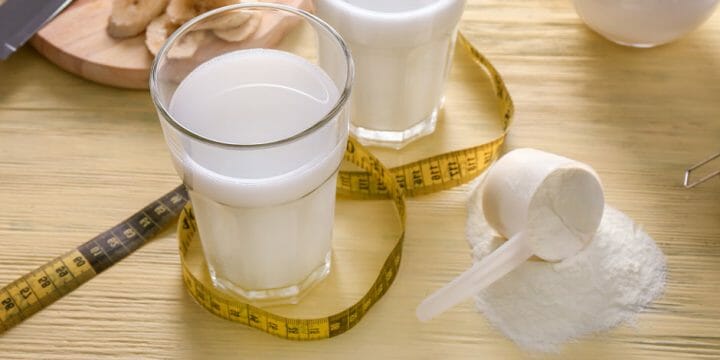If you've explored the health food or supplement aisle, you've likely encountered whey protein.
A versatile supplement for weight loss and gain, whey protein is essential for protein shakes. Originating as a byproduct of milk during cheese or yogurt production, whey is the liquid separated from casein.
It's then dried to create the popular whey protein powder. When shopping for whey protein, the two common types you'll find are whey protein isolate and concentrate.
To grasp their differences, let's dive deeper.
What is Whey Protein Isolate?

Whey protein isolate, with more processing than whey concentrate, packs a protein punch—often 90% or more per scoop [1].
Starting as whey from milk, it's dried and then fine-tuned, stripping away fats and carbs to become a protein-rich isolate.
Its lactose-free composition enhances gut health due to its high digestibility and specific amino acid profile, based on a study published in Current Topics in Nutraceutical Research [2].
Though similar to whey concentrate, isolate stands out with its hefty protein content, while concentrates vary widely, containing anywhere from 25–89% protein.
However, its efficacy is similar to that of concentrate.
Note that whey protein's quality can vary globally, influenced by regional dairy farming practices and regulations.

1. Typical Nutritional Value
- Protein: 23 grams
- Carbs: 1 gram
- Fat: 0 grams
- Lactose: Up to 1 gram
2. Benefits
- Contains less fat, carbs, and lactose than whey protein concentrate, so its great if you are counting macros.
- High protein content.
- Helps promote muscle growth and strength.
3. Cons
- Costs more than whey protein concentrate.
4. What Whey Protein Isolate Is Great For

Ideal for muscle gain, whey protein isolate is a top pick for post-workout shakes, thanks to its full deck of nine essential amino acids.
Therefore, if you're aiming to bulk up or slim down, isolates are your go-to, especially if you're watching your carbs or fat intake, according to the meta-analysis published in the Journal of the American College of Nutrition [3].
Plus, for the lactose-wary, it's a surprising friend, being low in lactose despite its dairy roots.

What is Whey Protein Concentrate?

In my experience coaching athletes, whey concentrate, a byproduct of cheese or yogurt making, offers a practical protein source after drying and processing [4].
Whey concentrate is less refined, rocking about 80% protein, but it's also richer in fat, carbs, and lactose compared to whey protein isolate.
Yet, it's still a smart pick if you're macro-counting.
There is a common misconception that because concentrates contain more fat and/or carbohydrates than isolates, that they are inherently worse for you, which is plain false.
- Duppler
1. Typical Nutritional Value

- Protein: 18 grams
- Carbs: 3.5 grams
- Fat: 1.5 grams
- Lactose: Up to 3.5 gram
2. Benefits
- Costs less than whey isolate protein, so its easier on your wallet if you're trying to save money.
- Can lead to muscle growth and an increase in strength.
3. Cons
- Contains more carbs, fat, and lactose than whey protein isolate.
- Has a lower protein content than whey protein isolate.
4. What Whey Protein Concentrate Is Great For
From my coaching days, I've seen whey concentrate excel in muscle building, especially in pre- or post-workout shakes, much like isolate.
They both provide essential muscle-building amino acids.
As a health coach, I find it fascinating that research in the Journal of Medical Science validates whey protein's role in boosting growth hormones [5].
Therefore, choosing between the two boils down to your nutrient needs and wallet size [6].
Isolate cuts back on carbs, fat, and lactose, which is a plus for weight loss fans, but it'll cost you more.
Therefore, whey protein concentrate is great if you have a tight budget or are not willing to spend that much on your whey protein.

Whey Protein Isolate vs. Concentrate
Recommended post:
References
- https://www.ncbi.nlm.nih.gov/pmc/articles/PMC3905294/
- https://research.wur.nl/en/publications/health-issues-of-whey-proteins-3-gut-health-promotion
- https://pubmed.ncbi.nlm.nih.gov/24724774/
- https://www.researchgate.net/publication/250206006_Studies_on_Whey_Protein_Concentrates_1_Compositional_and_Thermal_Properties1
- https://scialert.net/fulltext/?doi=jms.2018.27.33
- https://pubmed.ncbi.nlm.nih.gov/24724774/
About The Author
You May Also Like






